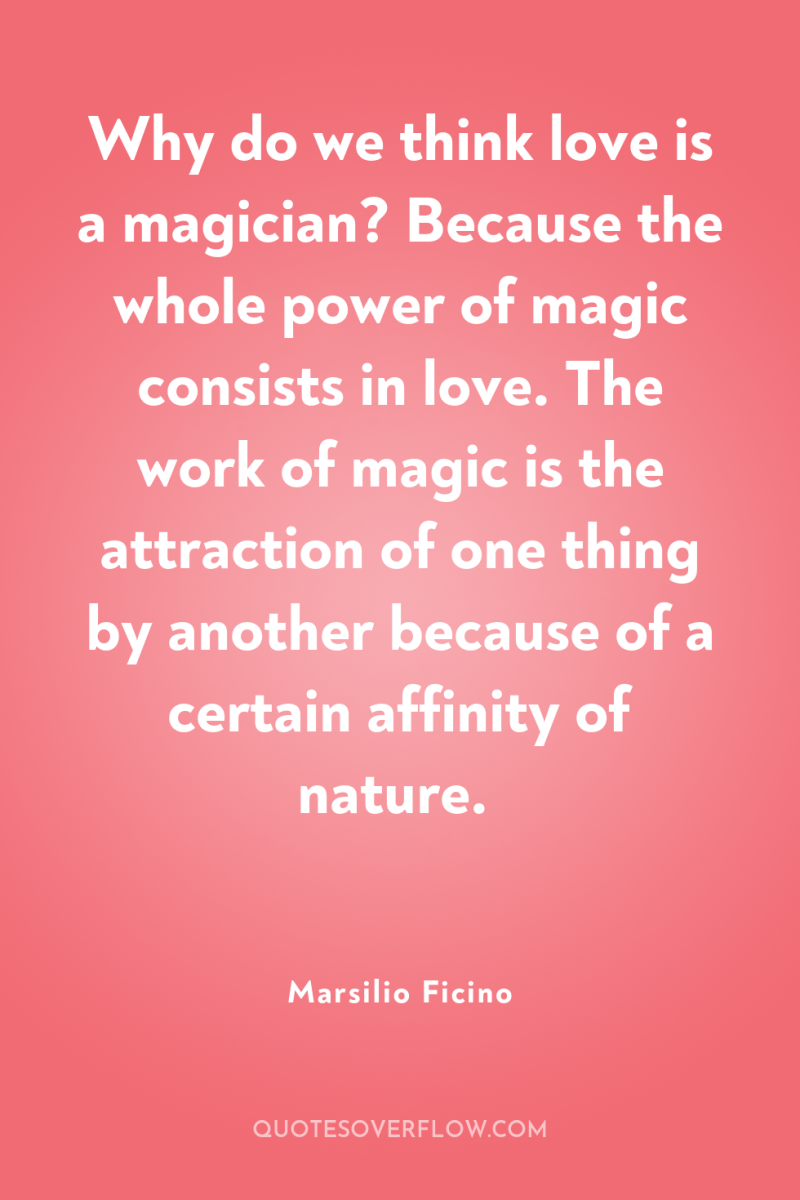
1
Why do we think love is a magician? Because the whole power of magic consists in love. The work of magic is the attraction of one thing by another because of a certain affinity of nature.Marsilio Ficino
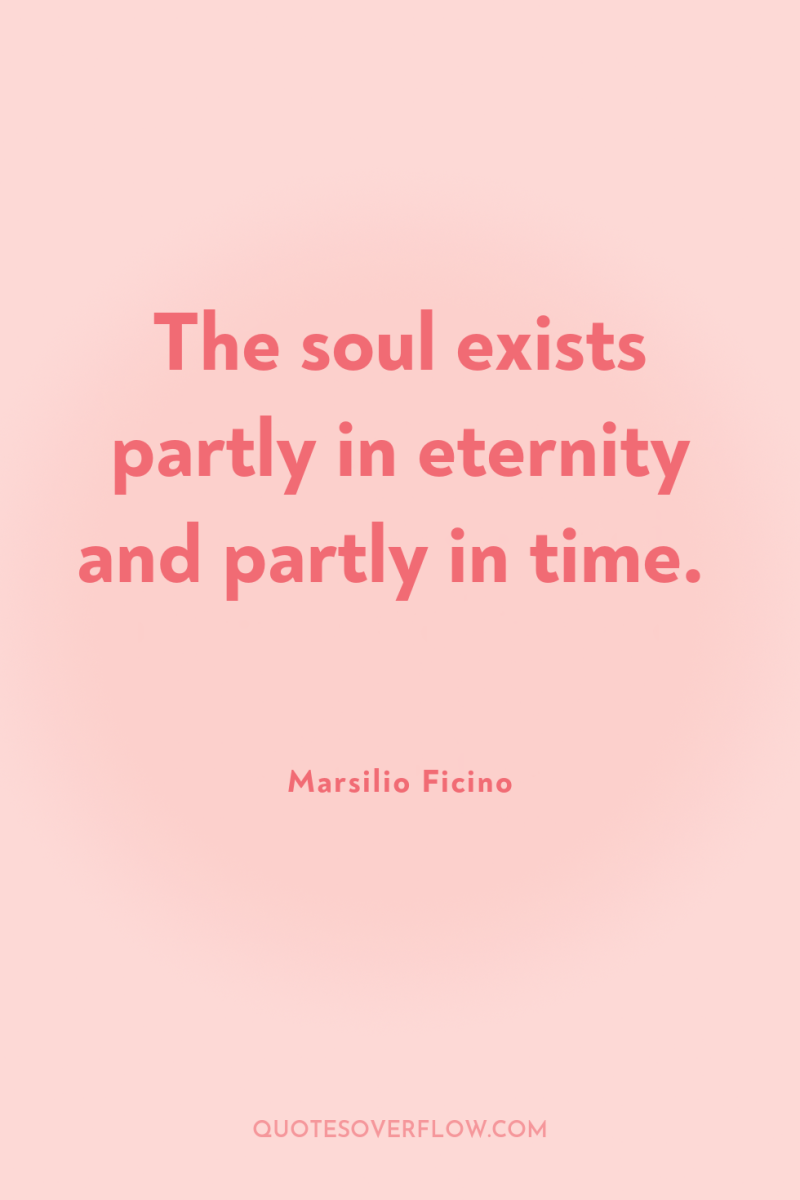
2
The soul exists partly in eternity and partly in time.Marsilio Ficino
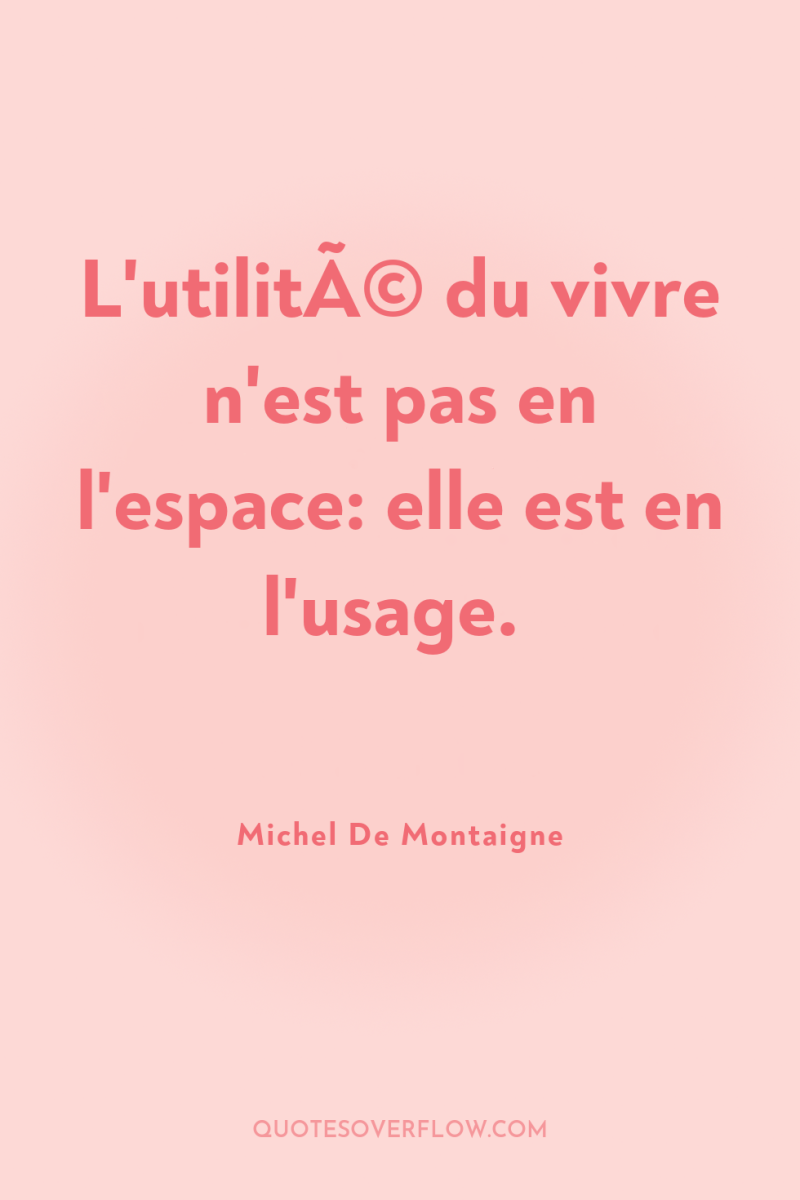
3
L'utilité du vivre n'est pas en l'espace: elle est en l'usage.Michel De Montaigne
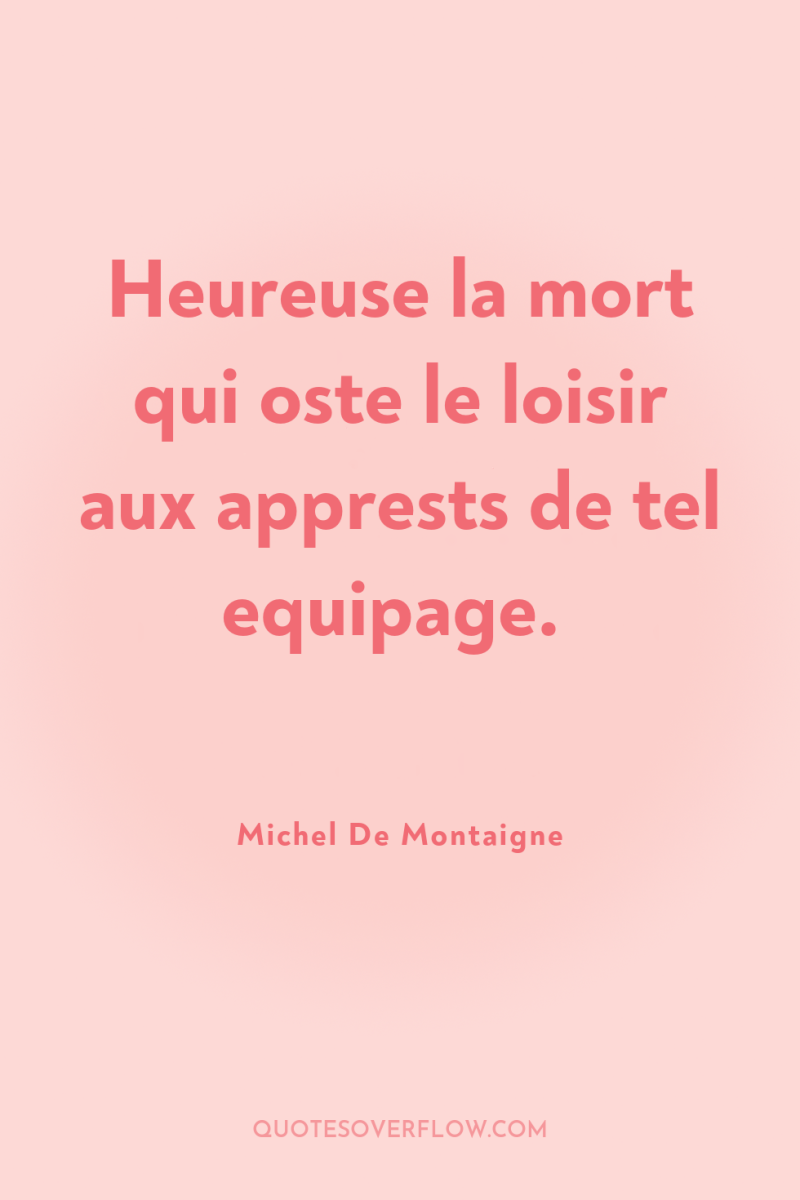
4
Heureuse la mort qui oste le loisir aux apprests de tel equipage.Michel De Montaigne
5
D'autant que nous avons cher, estre, et estre consiste en mouvement et action.Michel De Montaigne
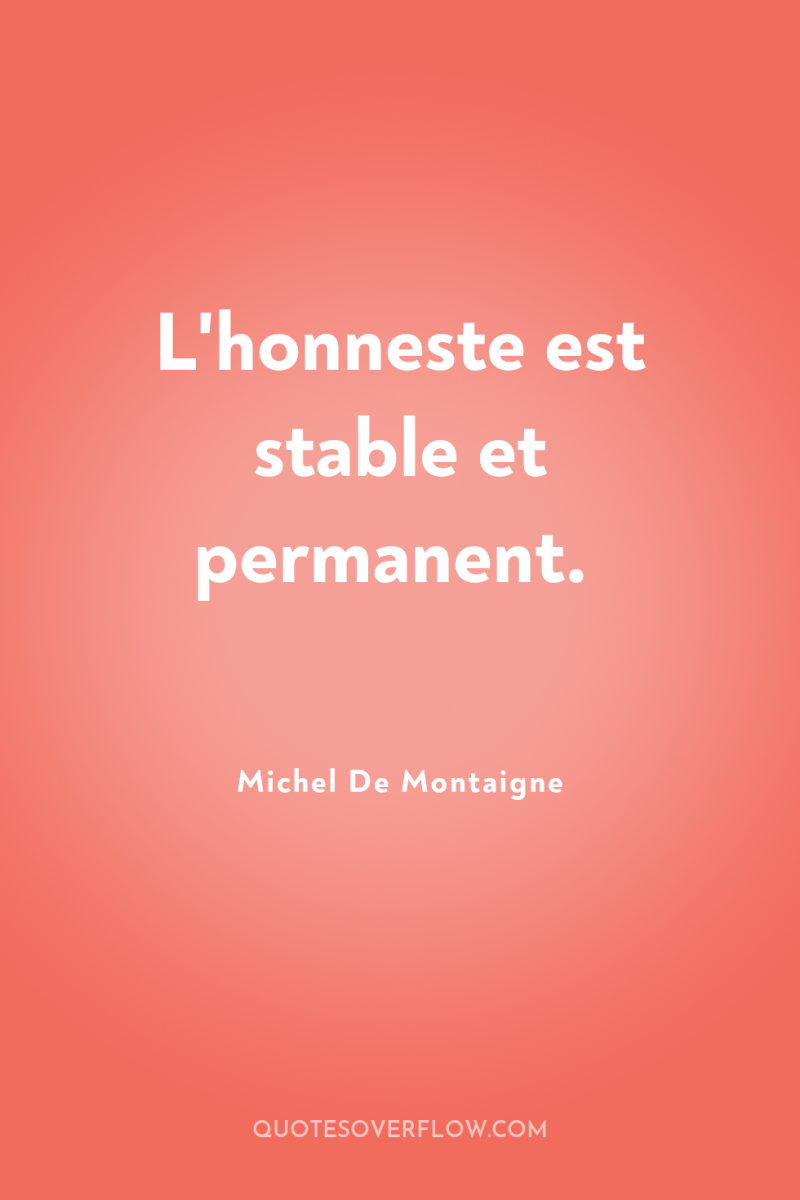
6
L'honneste est stable et permanent.Michel De Montaigne
7
J'accuse toute violence en l'education d'une ame tendre, qu'on dresse pour l'honneur, et la liberté.Michel De Montaigne
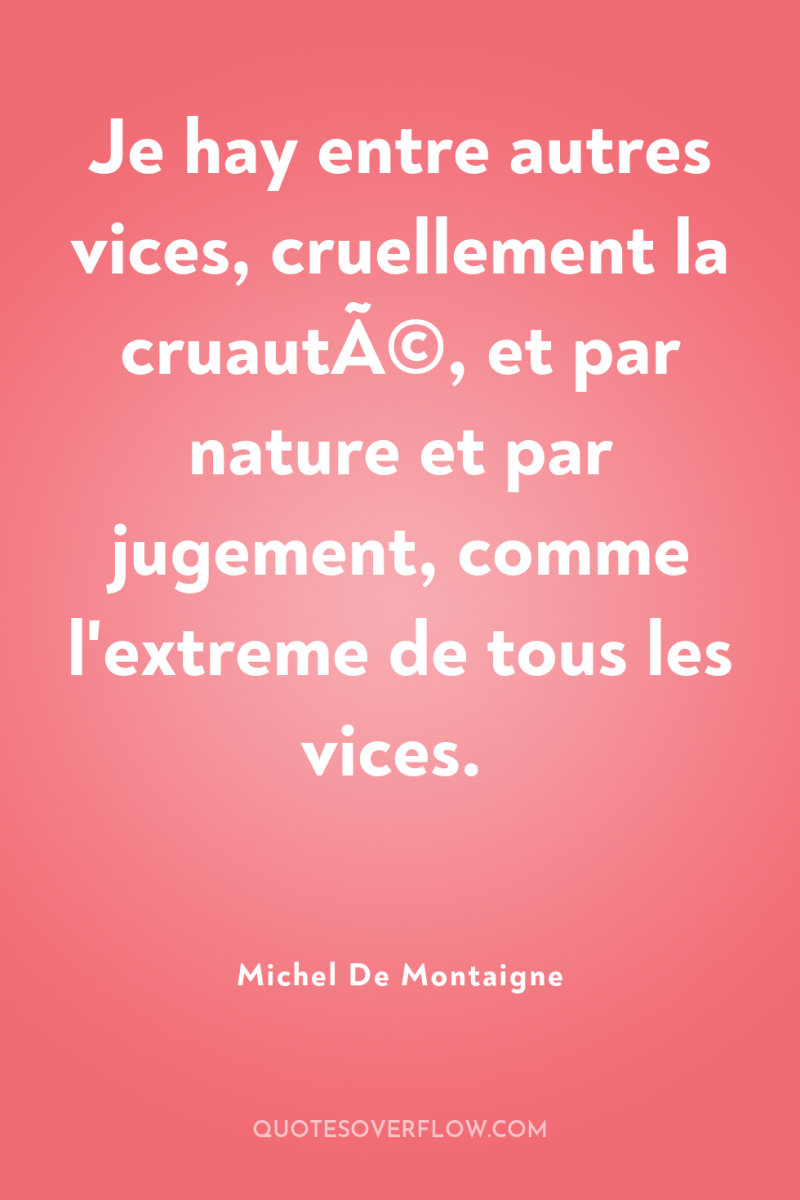
8
Je hay entre autres vices, cruellement la cruauté, et par nature et par jugement, comme l'extreme de tous les vices.Michel De Montaigne
9
Il n'est rien qui tente mes larmes que les larmes.Michel De Montaigne
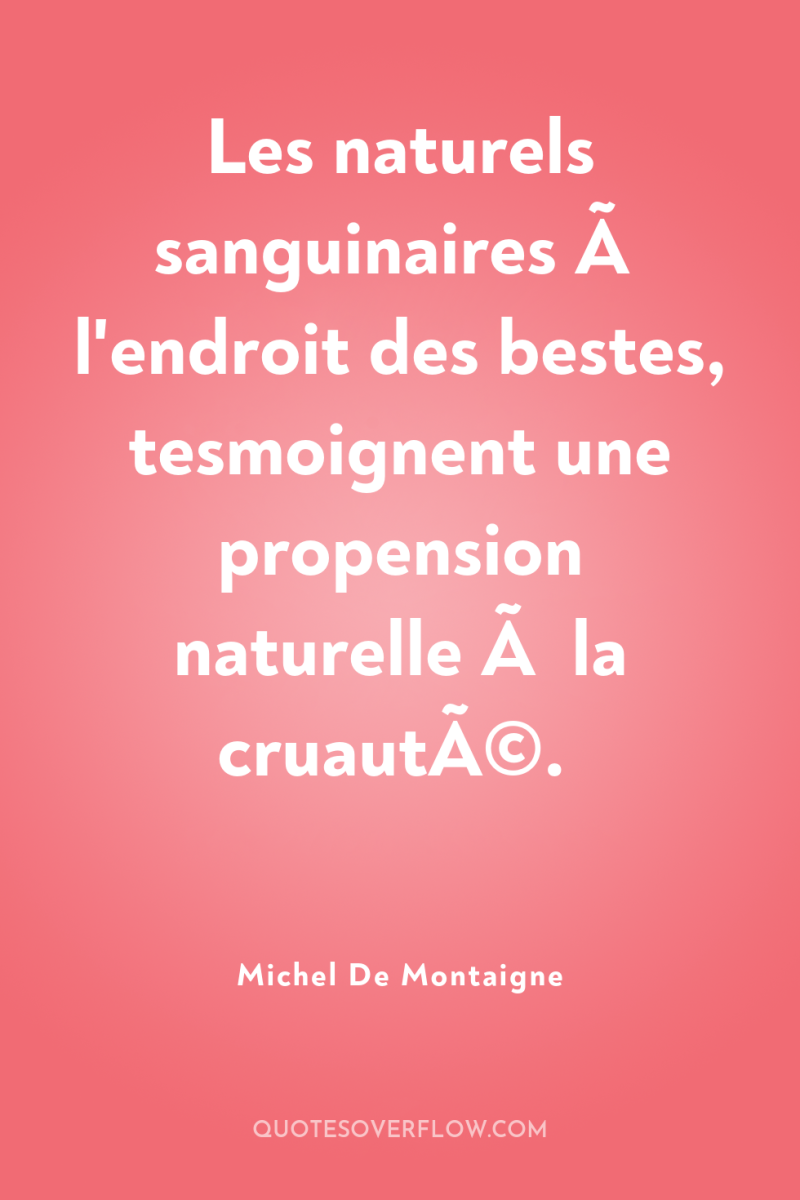
10
Les naturels sanguinaires à l'endroit des bestes, tesmoignent une propension naturelle à la cruauté.Michel De Montaigne
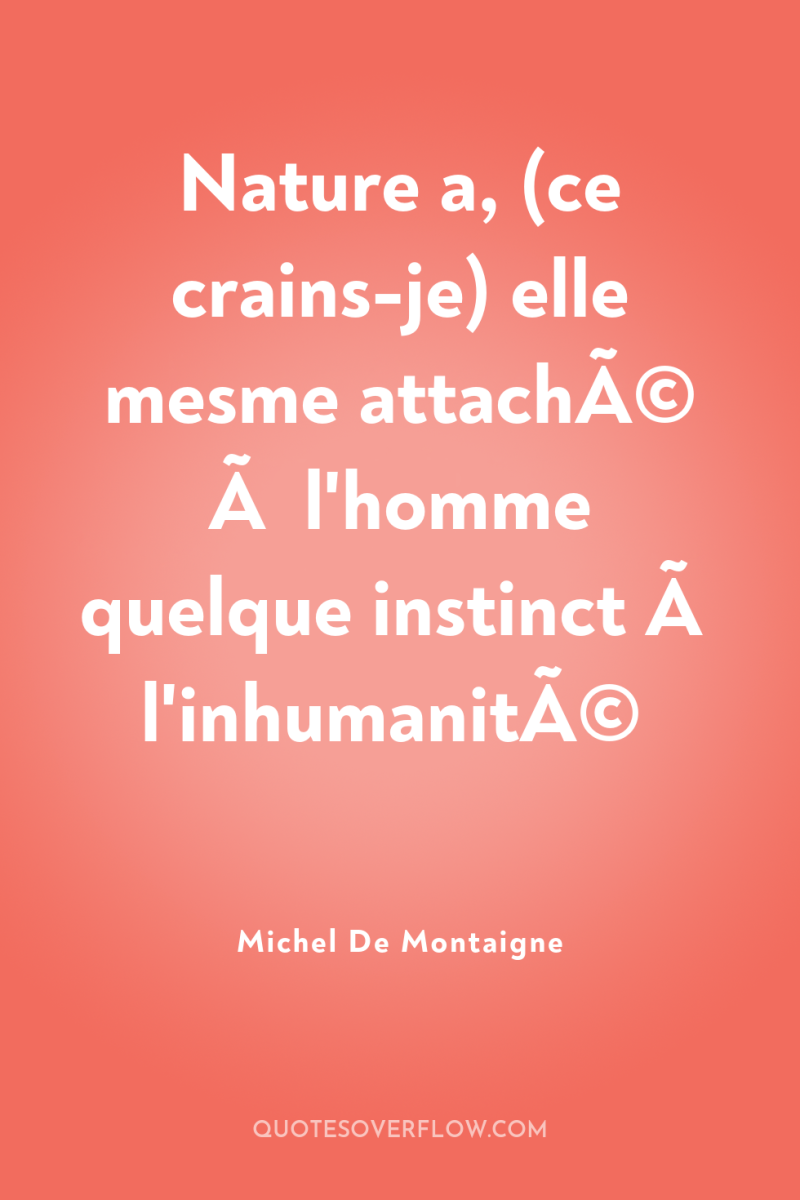
11
Nature a, (ce crains-je) elle mesme attaché à l'homme quelque instinct à l'inhumanitéMichel De Montaigne
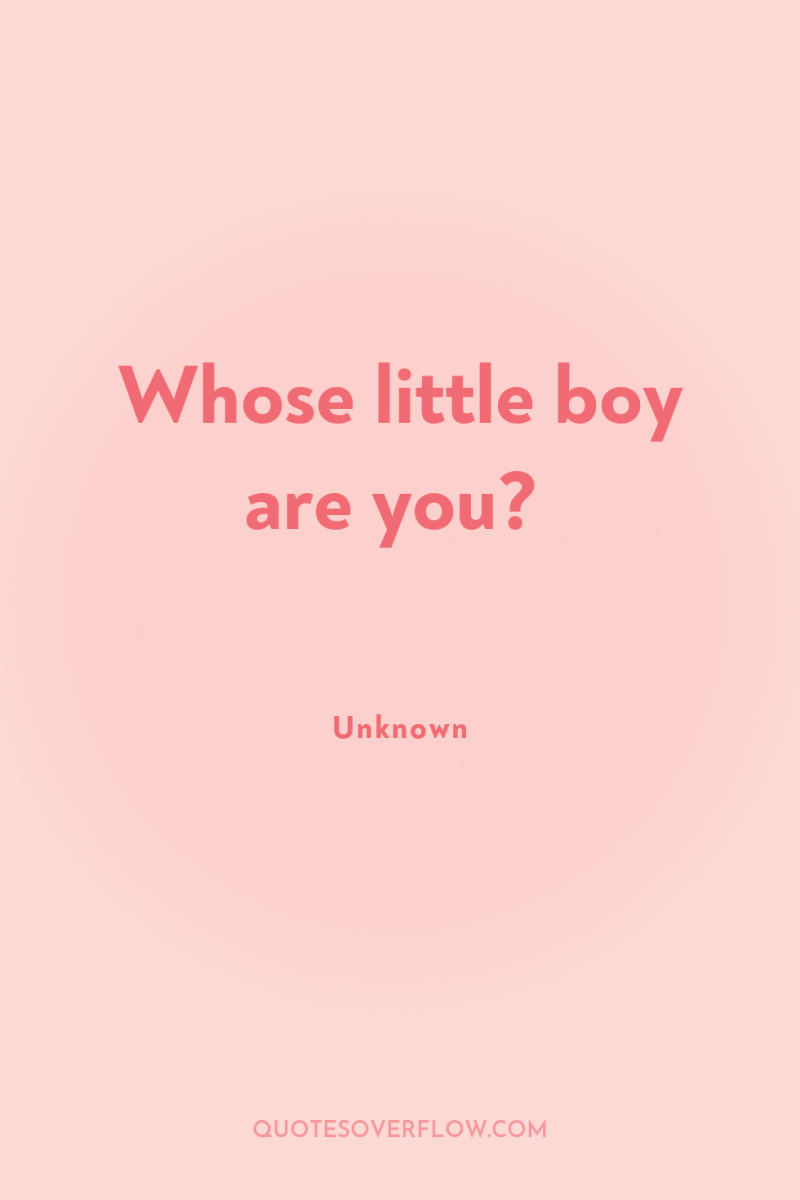
12
Whose little boy are you?Unknown
13
This was the end of the Renaissance. Culture, once beloved and fostered by the papacy, opened the way to dangerous freedom. Then - as now - knowledge, culture, intellectual curiosity became suspect, even dangerous to oppressive regimes: knowledge leading to engaging the mind into reasoning, culture into wanting to know more, intellectual curiosity sharpening the appetite for information, fact. Ignorance was considered safe and political oppression went hand in hand with the congregation of the Inquisition. .Gaia Servadio
14
There was a time in the ancient world - a very long time - in which the central cultural problem must have seemed an inexhaustible outpouring of books. Where to put them all? How to organize them on the groaning shelves? How to hold the profusion of knowledge in one's head? The loss of this plenitude would have been virtually inconceivable to anyone living in its midst. Then, not all at once but with the cumulative force of a mass extinction, the whole enterprise came to an end. What looked stable turned out to be fragile, and what had seemed for all time was only for the time being. .Stephen Greenblatt
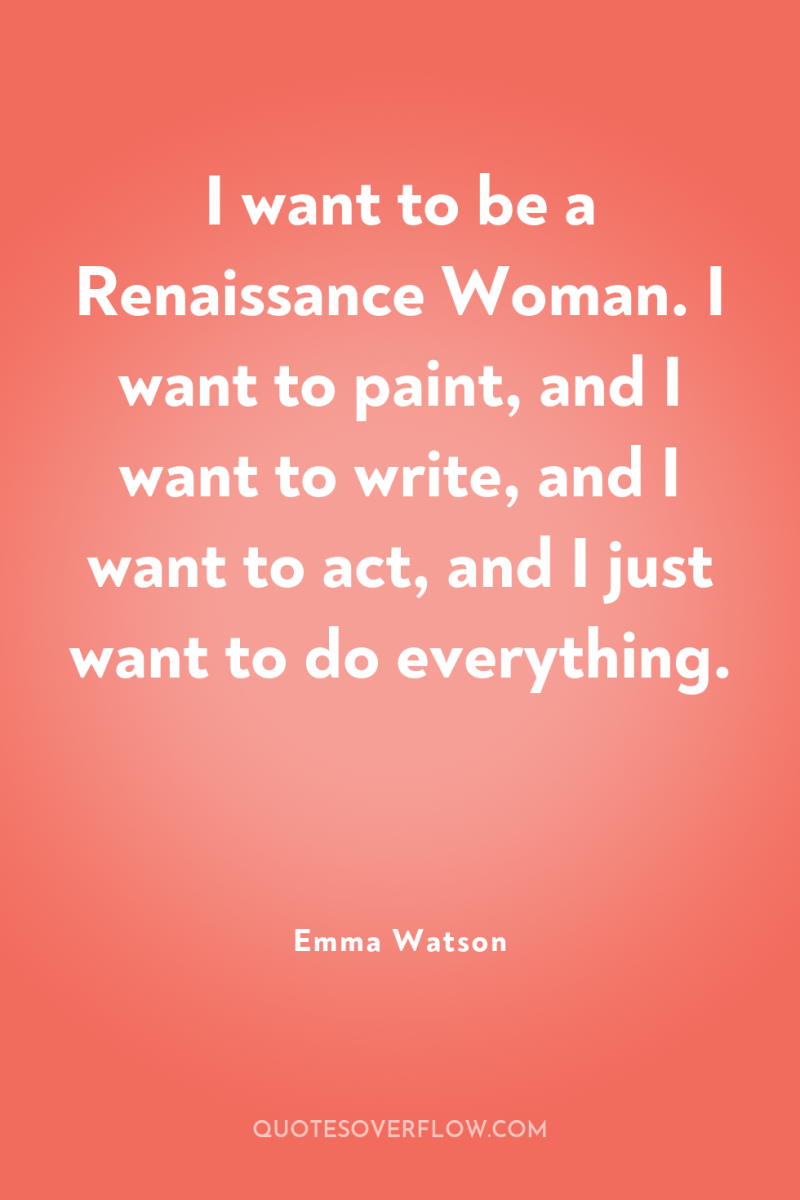
15
I want to be a Renaissance Woman. I want to paint, and I want to write, and I want to act, and I just want to do everything.Emma Watson
16
In other words, Botticelli's ideal women look like women and not boys. They're soft and curvaceous. Healthy and rounded. Women of the size figured in this painting were considered beautiful for centuries, if not millennia. They were the aesthetic ideal during my lifetime and long after." He brought his mouth to her neck before whispering, "My ideal hasn't changed.Sylvain Reynard
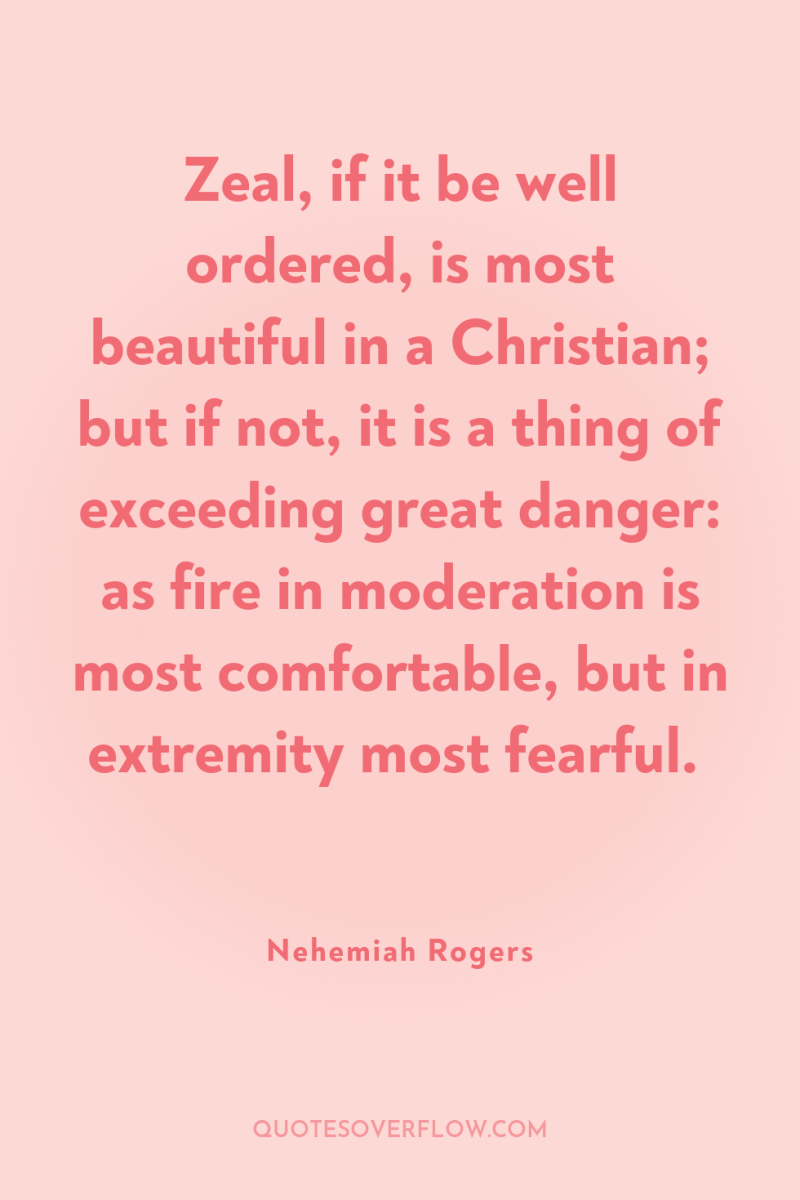
17
Zeal, if it be well ordered, is most beautiful in a Christian; but if not, it is a thing of exceeding great danger: as fire in moderation is most comfortable, but in extremity most fearful.Nehemiah Rogers
18
Art always penetrates the particular fissures in one's psychic life.Stephen Greenblatt
19
A comparably capacious embrace of beauty and pleasure - an embrace that somehow extends to death as well as life, to dissolution as well as creation - characterizes Montaigne's restless reflections on matter in motion, Cervantes's chronicle of his mad knight, Michelangelo's depiction of flayed skin, Leonardo's sketches of whirlpools, Caravaggio's loving attention to the dirty soles of Christ's feet.Stephen Greenblatt
20
The 'Renaissance' West Butchered the Rest.If I had to choose between an erudite Aristotle and an unknown ‘soulless’ black slave I would choose the latter. The ascendancy of the West was on a heap of bodies of slaves and trampled humanity through colonizationViktor Vijay Kumar
21
In short, it became possible - never easy, but possible - in the poet Auden's phrase to find the mortal world enough.Stephen Greenblatt
22
These two developments throw light on what is perhaps the most fundamental difference between the Renaissance and all previous periods of art. We have repeatedly seen that there were these circumstances which could compel the artist to make a distinction between the "technical" proportions and the "objective;" the influence of organic movement, the influence of perspective foreshortening, and the regard for the visual impression of the beholder. These three factors of variation have one thing in common: they all presuppose the artistic recognition of subjectivity. Organic movement introduces into the calculus of artistic composition the subjective will and the subjective emotions of the thing represented; foreshortening the subjective visual experience of the artist; and those "eurhythmic" adjustments which alter that which is right in favor of what seems right, the subjective visual experience of a potential beholder. And it is the Renaissance which, for the first time, not only affirms but formally legitimizes and rationalizes these three forms of subjectivity.Erwin Panofsky
23
Those who like to interpret historical facts symbolically may recognize in this the spirit of a specifically "modern" conception of the world which permits the subject to assert itself against the object as something independent and equal; whereas classical antiquity did not as yet permit the explicit formulation of this contrast; and whereas the Middle Ages believed the subject as well as the object to be submerged in a higher unity.Erwin Panofsky
24
PASSIONS are likened best to floods and streams: The shallow murmur, but the deep are dumb;Walter Raleigh
25
We've never heard About a marvel quite so great, For all the heroes who have lived In history can't measure up In bravery against the Maid.Christine De Pizan
26
Killing, raping and looting have been common practices in religious societies, and often carried out with clerical sanction. The catalogue of notorious barbarities — wars and massacres, acts of terrorism, the Inquisition, the Crusades, the chopping off of thieves’ hands, the slicing off of clitorises and labia majora, the use of gang rape as punishment, and manifold other savageries committed in the name of one faith or another – attests to religion’s longstanding propensity to induce barbarity, or at the very least to give it free rein. The Bible and the Quran have served to justify these atrocities and more, with women and gay people suffering disproportionately. There is a reason the Middle Ages in Europe were long referred to as the Dark Ages; the millennium of theocratic rule that ended only with the Renaissance (that is, with Europe’s turn away from God toward humankind) was a violent time. Morality arises out of our innate desire for safety, stability and order, without which no society can function; basic moral precepts (that murder and theft are wrong, for example) antedated religion. Those who abstain from crime solely because they fear divine wrath, and not because they recognize the difference between right and wrong, are not to be lauded, much less trusted. Just which practices are moral at a given time must be a matter of rational debate. The 'master-slave' ethos — obligatory obeisance to a deity – pervading the revealed religions is inimical to such debate. We need to chart our moral course as equals, or there can be no justice.Jeffrey Tayler
27
In the darkness, fear my light.Susann Cokal
28
Man is mortal. This is his fate. Man pretends not to be mortal. That is his sin. Man is a creature of time and place, whose perspectives and insights are invariably conditioned by his immediate circumstances.Sylvan Barnet
29
It is only rather recently that science has begun to make peace with its magical roots. Until a few decades ago, it was common for histories of science either to commence decorously with Copernicus's heliocentric theory or to laud the rationalism of Aristotelian antiquity and then to leap across the Middle Ages as an age of ignorance and superstition. One could, with care and diligence, find occasional things to praise in the works of Avicenna, William of Ockham, Albertus Magnus, and Roger Bacon, but these sparse gems had to be thoroughly dusted down and scraped clean of unsightly accretions before being inserted into the corners of a frame fashioned in a much later period.Philip Ball
30
Success is not final, failure is not fatal. It is the courage to carry on that counts. Winston ChurchillH.A. Corby
31
I shower in the dark, barely able to tell soap from conditioner, and tell myself that I will emerge new and strong, that the water will heal me.Veronica Roth
32
[how can anyone] be silly enough to think himself better than other people, because his clothes are made of finer woolen thread than theirs. After all, those fine clothes were once worn by a sheep, and they never turned it into anything better than a sheep.Thomas More
33
The true Renaissance person is endowed with panoramic attention.... The habit of noticing the ensemble of everything and its constituent parts is a matter of will, not of innate aptitude. It involves the conscious noticing of things and the gaps that separate and connect them.Christy Wampole
34
Nobody can understand the greatness of the thirteenth century, who does not realize that it was a great growth of new things produced by a living thing. In that sense it was really bolder and freer than what we call the renaissance, which was a resurrection of old things discovered in a dead thing.. and the Gospel according to St. Thomas.. was a new thrust like the titanic thrust of Gothic engineering; and its strength was in a God that makes all things new.G.k. Chesterton
35
We have given to thee, Adam, no fixed seat, no form of thy own, no gift peculiarly thine, that thou mayest feel as thine own, have as thine own, possess as thine own, the seat, the form, the gifts which thou thyself shalt desire. A limited nature in other creatures is confined within the laws written down by Us. In conformity with thy free judgment, in whose hands I have placed thee, thou art confined by no bounds; and thou will fix the limits of nature for thyself. I have placed thee at the centre of the world, that from there thou mayest more conveniently look around and see whatsoever is in the world. Neither heavenly nor earthly, neither mortal nor immortal have We made thee. Thou, like a judge appointed for being honourable, art the molder and maker of thyself.Unknown
36
Now having travelled from the pride of man in the High Renaissance and the Enlightenment down to the present despair, we can understand where modern people are. They have no place for a personal God. But equally they have no place for man as man, or for love, or for freedom, or for significance. This brings a crucial problem. Beginning only from man himself, people affirm that man is only a machine. But those who hold this position cannot live like machines! If they could, there would be no tensions in their intellectual position or in their lives. But even people who believe they are machines cannot live like machines, and thus they must “leap upstairs” against their reason and try to find something which gives meaning to life, even though to do so they have to deny their reason. This was a solution Leonardo da Vinci and the men of the Renaissance never would have accepted, even if, like Leonardo they ended their thinking in despondency. They would not have done so, for they would have considered it intellectual suicide to separate meaning and values from reason this way. And they would have been right. Such a solution is intellectual suicide, and one may question the intellectual integrity of those who accept such a position when their starting point was pride in the sufficiency of human reason.Francis A. Schaeffer
37
The medieval period based its scriptural exegesis upon the Vulgate translation of the Bible. There was no authorized version of this text, despite the clear need for a standardized text that had been carefully checked against its Hebrew and Greek originals. A number of versions of the text were in circulation, their divergences generally being overlooked. It was not until 1592 than an 'official' version of the text was produced by the church authorities, sensitive to the challenges to the authority of the Vulgate by Renaissance humanist scholars and Protestant theologians. .Unknown
38
During periods of root expansion things have always looked as confused and topsy-turvy and purposeless as they do now. The whole Renaissance is supposed to have resulted from the topsy-turvy feeling caused by Columbus’ discovery of a new world. It just shook people up. The topsy-turviness of that time is recorded everywhere. There was nothing in the flat-earth views of the Old and New Testaments that predicted it. Yet people couldn’t deny it. The only way they could assimilate it was to abandon the entire medieval outlook and enter into a new expansion of reason. .Robert M. Pirsig
39
Love is the linchpin that connects the material world with higher levels of existence.Julianne Davidow
40
We are fascinated by Ramses as Renaissance Christians were by the American Indians, those (human?) beings who had never known the word of Christ.Jean Baudrillard
41
The Dark Ages gradually ended six centuries ago with the Renaissance, which seeded new ideas for a different world. The Renaissance ideal dominated our culture until three centuries ago, from the 14th to the 18th century, when it was superseded by modernism. Not surprisingly, this human ideal has almost been forgotten in our culture. The Renaissance, literally "re-birth", was a revival and rediscovery of classical Greek and Roman culture following the decline of culture, trade, and technology during the Dark Ages. .Jacob Lund Fisker
42
In Venice, things not always as they first appear. I contemplate this observation from my post on the aft deck of one of Master Fumagalli’s gondolas, taking in the panorama of bridges, domes, bell towers, and quaysides of my native city. I row into the neck of the Grand Canal, and, one by one, the reflection of each colorful façade appears, only to dissipate into wavering, shimmering shards under my oar.Laura Morelli
43
It is certain that the labors of these early workers in the field of natural knowledge were brought to a standstill by the decay and disruption of the Roman Empire, the consequent disorganisation of society, and the diversion of men's thoughts from sublunary matters to the problems of the supernatural world suggested by Christian dogma in the Middle Ages. And, notwithstanding sporadic attempts to recall men to the investigation of nature, here and there, it was not until the fifteenth and sixteenth centuries that physical science made a new start, founding itself, at first, altogether upon that which had been done by the Greeks. Indeed, it must be admitted that the men of the Renaissance, though standing on the shoulders of the old philosophers, were a long time before they saw as much as their forerunners had done.Thomas Henry Huxley
44
No matter who you were in sixteenth-century Europe, you could be sure of two things: you would be lucky to reach fifty years of age, and you could expect a life of discomfort and pain. Old age tires the body by thirty-five, Erasmus lamented, but half the population did not live beyond the age of twenty. There were doctors and there was medicine, but there does not seem to have been a great deal of healing. Anyone who could afford to seek a doctor's aid did so eagerly, but the doctor was as likely to maim or kill as to cure. His potions were usually noxious and sometimes fatal–but they could not have been as terrible and traumatic as the contemporary surgical methods. The surgeon and the Inquisitor differed only in their motivation: otherwise, their batteries of knives, saws, and tongs for slicing, piercing, burning, and amputating were barely distinguishable. Without any anesthetic other than strong liquor, an operation was as bad as the torments of hell. .Philip Ball
45
The next time somebody announces that he plans to get Medieval on your ass, tell him you're going to get Renaissance on his gonads.James K. Morrow
46
The late 20th century had just enough communication abilities to allow superstar-ness and communality to happen. It was a musical renaissance that rivals the visual one that happened in the 1400s.Daryl Hall
47
I was determined to make Renaissance Man Food Services and Herschel's Famous 34 major players in a very tough industry.Herschel Walker
48
I got a New York designer to build my dream store here, which is a little bit of Florence in New York. It's like the Duomo on Madison. I got inspired by Santa Maria Novella and all the Renaissance architecture.Edgardo Osorio
49
Destroying rainforest for economic gain is like burning a Renaissance painting to cook a meal.E. O. Wilson